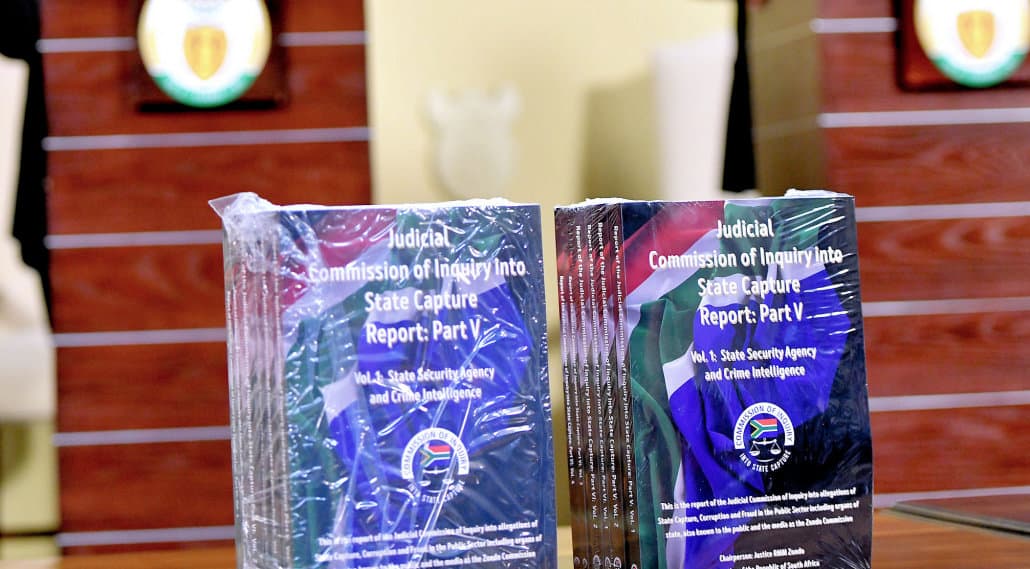The state capture commission has found that the ANC played a major role in state capture in the country, having not taken action when allegations of an improper relationship between its former president Jacob Zuma and the Gupta family surfaced. The final instalment of the report of the commission was handed over to President Cyril Ramaphosa in June.
The party’s inertia against allegations brought forward by public servants to its leadership from around 2016, and its hesitancy to act on allegations brought before Parliament around the same time, helped enable the capture of certain government departments and institutions. Its cadre deployment policy, said commission chairperson Chief Justice Raymond Zondo, was unconstitutional and unfairly prejudiced members of the public who were qualified and sought careers in state institutions, but were not on the radar of the deployment committee.
Ramaphosa, who chaired the committee from 2012 to 2016 in his capacity as deputy president of the ANC, had a lot to answer for.
“The ANC’s deployment policy itself identifies that the process can be abused. It notes that ‘the potential for NEC members to have political or other interests in the deployment of particular cadres to particular positions cannot be ruled out’.”
Zondo further notes: “It must be noted that President Ramaphosa was the chairperson of the deployment committee for a period of five years … and that many of these appointments (and indeed the excesses of state capture) occurred during this period. Notably, this is also the period for which the party could produce no minutes or records. It is not sufficient for President Ramaphosa to focus on the future of the party and his envisaged renewal process. Responsibility ought to be taken for the events of the previous ‘era’. He did so partially and only in the most general terms.”
Noting the evidence of both Ramaphosa and ANC chairperson Gwede Mantashe with regard to the notion of separation of powers, Zondo found that there was a culture of putting party before national interest, even in instances where this should not be the case. “It is evident from Mr Mantashe’s evidence that the ANC’s self-identification as a leader of society has led to the conflation two notions: the interests of the party and the constitutionally enshrined public duty of those in government.
“The decision by the ANC to ignore a number of allegations directed at Mr Jacob Zuma and the influence the Gupta family on key functions in the state, as well as obstructing various avenues to achieve accountability in this regard, has seen the ANC sacrifice its public duty in order to protect the party,” Zondo further noted.
He cited the occasions in Parliament where opposition parties would bring no-confidence motions against Zuma, only for the ANC members to be coerced into voting against them. Mantashe’s defence of the party’s stance in this regard, did not escape Zondo’s observation.
“Mr Mantashe asserted that the removal of a president is a matter of party organisational discipline which should best be dealt with within the confines of the party. What is strange about this view is that the ANC as a party was not doing anything internally to investigate the allegations that formed the basis of the motion of no confidence in President Zuma. So, if the removal of a president of the country was a matter for the ANC to handle internally, when were they going to handle it internally?
“The ANC had the opportunity to get Parliament to initiate a public inquiry in terms of its rules to look into the allegations of the influence of the Gupta family on president Zuma but not only did they not do so but even when another political party, the DA, tabled a motion for the initiation of such enquiry the ANC opposed that motion. It was only in 2017 that the ANC changed its position and began to support the idea of public inquiries.”
Zondo further found that instead of the lack of action from the ANC being characterised as a ‘’delay’’ as Ramaphosa would like it to be known, it should be seen as a firm decision not to act against Zuma and others who were complicit in state capture. The only action that was taken occurred in later years, and after the allegations of state capture had been investigated by former public protector Thuli Madonsela. Even the move to endorse the establishment of a commission as per Madonsela’s remedial action in the 2016 State of Capture report, was not out of the will of the whole party.
For the ANC to truly realise its renewal objective, it needs to look into its past and review its own methods, Zondo writes. “In my view it is a problem that will stand in the way of renewal because it has to mean doing things differently from how the organisation has done things before, which includes acting decisively against corruption and those involving themselves in corruption but they and their supporters may accuse the other group of threatening the unity of the organisation.
“I say what I say in this context because it is not possible to find solutions to state capture and corruption if the ruling party does things either to protect those involved in corruption and state capture or adopts positions that constitute fertile ground for state capture and corruption.”

